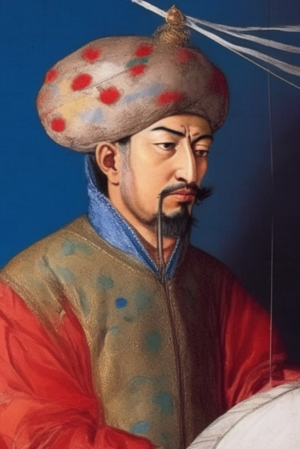Difference between revisions of "Menid"
m |
|||
| Line 39: | Line 39: | ||
}} | }} | ||
'''Menid''' (born 18 April, 1359 – died 14 November, 1407) was a Shavakhotian conqueror of Yiric descent, who founded the Menidid Empire in the late 14th century. Considered to be the one of the greatest military leaders in history, he is widely regarded to have never lost a battle. Rising from obscurity to become a formidable conqueror and ruler, Menid's life and reign left an indelible mark on Western Vaniua, shaping its political landscape and cultural identity. | |||
Menid was born into a noble family in the northwest of Shavakhotia, during a period of political instability. In 1380, following the death of the reigning monarch X without a heir, Shavakhotia plunged into chaos as rival factions vied for control of the throne. At the age of 21, Menid was already recognized for his military prowess and leadership abilities, having been enlisted by the monarchy as a military commander. Seizing the opportunity presented by the vacuum of power, Menid orchestrated a dramatic usurpation of power, proclaiming himself ruler and establishing the Menidid Empire in 1381. | |||
Menid's reign was marked by a series of ambitious military campaigns aimed at expanding the boundaries of his empire. In 1387, he successfully annexed Lenezan, a region fraught with political complexities due to its multiethnic. His most significant conquest came in 1392, when he invaded the Holy Shanyedate and captured its capital, Anevem, thereby extending his dominion to its maximum territorial extent. | |||
Menid's approach to governance evolved over the course of his reign, reflecting the complexities of ruling over a diverse and heterogeneous population. Initially, his conquests were accompanied by ruthless suppression, particularly targeting non-Shavakhotian populations such as the Lenezi. However, as the empire expanded and diversified, Menid adopted more inclusive policies aimed at integrating and legitimizing his rule. Initiatives such as promoting common religious identity, incorporating Lenezi culture, and fostering economic development were employed to consolidate imperial control and foster social cohesion. | |||
Menid's reign, though relatively brief, left a lasting legacy on the history of Shavakhotia. His empire ushered in an era of significant political and cultural transformation, shaping the region's future trajectory. However, Menid's death in 1407 marked the beginning of internal strife within the empire, eventually leading to its fragmentation and the emergence of new power dynamics in the region. | |||
==Early life== | |||
X. | |||
==Rise to power== | |||
X. | |||
==Period of expansion== | |||
X. | |||
===Conquest of Lenezan=== | |||
X. | |||
==Campaign against the Holy Shanyedate== | |||
X. | |||
==Later Conquests== | |||
X. | |||
===The Yeshub=== | |||
X. | |||
==Death== | |||
X. | |||
==Succession== | |||
X. | |||
==Legacy== | |||
X. | |||
[[Category:People]] [[Category:Monarchs]] [[Category:Political leaders]] [[Category:Military leaders]] [[Category:Historical figures]] [[Category:Shavakhotia]] | |||
Latest revision as of 16:37, 29 April 2024
| Menid | |
|---|---|
 Portrait by X | |
| Reign | 23 December 1380 – 14 November 1407 |
| Coronation | 28 January 1381 |
| Successor | X |
| Born | 18 April 1359 Northwestern Shavakhotia |
| Died | 14 November 1407 (aged 48) Near Afąván(modern day Lenezan) |
| Burial | Tomb Of The King, Menitakha, Shavakhotia |
| Dynasty | Menidid |
| Religion | Zarasaism |
Menid (born 18 April, 1359 – died 14 November, 1407) was a Shavakhotian conqueror of Yiric descent, who founded the Menidid Empire in the late 14th century. Considered to be the one of the greatest military leaders in history, he is widely regarded to have never lost a battle. Rising from obscurity to become a formidable conqueror and ruler, Menid's life and reign left an indelible mark on Western Vaniua, shaping its political landscape and cultural identity.
Menid was born into a noble family in the northwest of Shavakhotia, during a period of political instability. In 1380, following the death of the reigning monarch X without a heir, Shavakhotia plunged into chaos as rival factions vied for control of the throne. At the age of 21, Menid was already recognized for his military prowess and leadership abilities, having been enlisted by the monarchy as a military commander. Seizing the opportunity presented by the vacuum of power, Menid orchestrated a dramatic usurpation of power, proclaiming himself ruler and establishing the Menidid Empire in 1381.
Menid's reign was marked by a series of ambitious military campaigns aimed at expanding the boundaries of his empire. In 1387, he successfully annexed Lenezan, a region fraught with political complexities due to its multiethnic. His most significant conquest came in 1392, when he invaded the Holy Shanyedate and captured its capital, Anevem, thereby extending his dominion to its maximum territorial extent.
Menid's approach to governance evolved over the course of his reign, reflecting the complexities of ruling over a diverse and heterogeneous population. Initially, his conquests were accompanied by ruthless suppression, particularly targeting non-Shavakhotian populations such as the Lenezi. However, as the empire expanded and diversified, Menid adopted more inclusive policies aimed at integrating and legitimizing his rule. Initiatives such as promoting common religious identity, incorporating Lenezi culture, and fostering economic development were employed to consolidate imperial control and foster social cohesion.
Menid's reign, though relatively brief, left a lasting legacy on the history of Shavakhotia. His empire ushered in an era of significant political and cultural transformation, shaping the region's future trajectory. However, Menid's death in 1407 marked the beginning of internal strife within the empire, eventually leading to its fragmentation and the emergence of new power dynamics in the region.
Early life
X.
Rise to power
X.
Period of expansion
X.
Conquest of Lenezan
X.
Campaign against the Holy Shanyedate
X.
Later Conquests
X.
The Yeshub
X.
Death
X.
Succession
X.
Legacy
X.